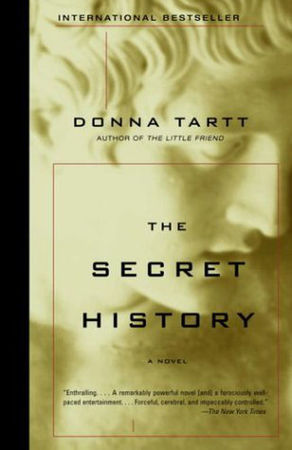 Written by Lauryn Smith Immediately after finishing Donna Tartt’s “The Goldfinch” earlier this year, I thought “this-author-and-her-books-are-so-good-I-need-more-like-now.” Luckily, I own a copy of “The Secret History,” which I first read back in high school. Reading it again, my conviction that this woman will forever be one of my favorite authors is even stronger. “The Secret History” is Tartt’s debut novel. In it, she tells the fictional tale of a tightly knit, isolated group of six students who study Greek at an elite New England college. Yawn? I think not. Tartt presents the novel’s entire premise from the get-go, so I am not giving away a major plot point when I tell you that one member of the group is murdered by the others. “The Secret History” is commonly referred to as a “murder mystery in reverse.” Once readers are alerted of the murder, the remainder of the book explores the execution and consequences of the crime, as well as the reason behind it. The narrative is presented as a years-later reflection from the perspective of one of the students, Richard Papen. As he details his college experience, he focuses on the peculiarities of his Greek classmates and Julian, the group’s eccentric, highly revered professor, who is also, unconventionally, the group's only professor. Richard relates the nuanced elements of the many and varied interactions he has with each member of the clique, and these elements incessantly compound until they explode into one of the best twist endings you will ever encounter. Tartt’s writing is graceful and effortless. Take the entirely accessible dialog as an example: “Well, you know what Julian would say… There are such things as ghosts. People everywhere have always known that. And we believe in them every bit as much as Homer did. Only now, we call them by different names. Memory. The unconscious.” Tartt’s words have beauty, depth and ease throughout the book’s entirety.
Likewise, the imaginative way in which Tartt pieces the puzzle together is unparalleled. This is best evidenced by the phenomenal characterization, key in the novel's success. Readers get a true sense of the individual characters’ personalities and motivations. Each is distinct and purposeful. And it is guaranteed that you will love and hate each one at one point or another. Even the lesser characters get their due attention, establishing them as realistic, significant and worth paying attention to. Despite its complexity, not once is the plot of “The Secret History” confusing. Tartt’s overall structure, with her transitions between past, present and future, is seamless. Plus, her balance of each of the story's aspects is on point. Nothing is over-discussed, nothing is left lacking. Even better, readers are exposed to philosophy and high levels of thought in a manner that is unintimidating. What’s more (yes, there is more!), Tartt makes unattainable physical and psychological outcomes, such as those some of the students experience through the practice of Dionysian rituals, seem entirely plausible. Perhaps these aspects are convincing because of the authenticity that is apparent throughout the novel, whether from the thoughtfully quoted Ancient Greek, the focus on beauty or the clear respect for philosophical thought. It is difficult to determine what could make “The Secret History” better. Perhaps a greater focus on and definition of Julian would deepen readers’ understanding of the students' motivation to enact the Dionysian ritual, which initiates the host of events that comprise the rest of the novel. On the other hand, it is exactly Julian's elusiveness that ideates him as the intriguing, graceful, enigmatic character that he is, arguably by necessity. While reading “The Secret History,” it is impossible not to gain a more developed sense of empathy, a consideration for the ways in which others think. Logic alone does not make something factually or morally acceptable, but sometimes said logic can be defended nonetheless. For example, the group honestly believes that killing one of their own is an absolute necessity. And Richard, though often objective, does not resist likely due to the group's influence and apparently sound reasoning. As Tartt illustrates, group dynamics and interpersonal relationships are more complex and impactful than we tend to notice as we go about our everyday lives. I think it is clear by this point that I highly recommend “The Secret History.” It includes facets that can entertain any reader. Criminality, wealth dynamics, secrecy, romance—it’s all there, and it’s all tasteful. The best part is that even though the read is a good workout for your brain, it is very accessible, and you can easily get lost in the book's pages. This book is one you will want to discuss with anyone and everyone. Title: The Secret History Author: Donna Tartt Publisher: Vintage Publication date: April 13, 2004 Original publication date: September 1992 Page count: 576 List price: $16.95 ISBN: 978-1400031702 Awards: 1994 Mekka-prijs; 1994 Prix des libraires du Quebec for Laureats hors Quebec
0 Comments
Your comment will be posted after it is approved.
Leave a Reply. |

Enjoying my book reviews? If you’ve found them helpful or simply love diving into a good book, consider supporting my caffeine-fueled reading sessions! Your contribution helps keep the reviews coming and ensures I stay wide awake for those late-night reading marathons. Cheers to a shared love for literature! ☕️
Categories
All
|
